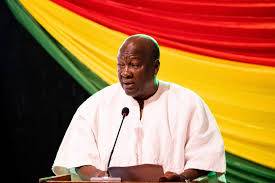Fairness and Integrity: Mahama Urges Electoral Commission to Stay Consistent

Context: A Call for Electoral Transparency
In a charged political climate, President-elect John Dramani Mahama has raised critical concerns about the Ghana Electoral Commission's (EC) handling of disputed parliamentary results. Addressing African ambassadors and high commissioners, Mahama called for consistency and fairness, qualities he deemed essential to preserving public trust and the credibility of Ghana’s democratic process.
The EC's Controversial Decision
The EC recently announced it would not uphold parliamentary results in nine constituencies, citing claims that declarations were made under duress. The affected areas include Ablekuma North, Nsawam-Adoagyiri, Techiman South, and Dome-Kwabenya. This decision, however, has sparked debates over selective rule enforcement.
Mahama pointed out the EC’s contrasting stance during the 2020 elections when it declared results in Techiman South despite similar objections and irregularities. He argued, “You cannot change the rules when it suits you and apply different rules under different circumstances.â€
Lessons from the Past: Techiman South’s Controversy
In 2020, the Techiman South constituency became a flashpoint when the EC announced results amidst military presence and reported chaos. Back then, the EC maintained that any grievances should be addressed in court, a position now at odds with its latest actions.
Mahama's criticism highlights a broader issue: how inconsistent policies risk eroding public trust in democratic institutions. When rules appear malleable, perceptions of bias grow, creating fertile ground for political unrest.
Why Fairness and Transparency Matter
Fair elections are the cornerstone of any democracy. They ensure citizens feel heard and represented. In Mahama’s words, “Justice must not only be done but must be seen to be done.†This appeal resonates with Ghanaians who value transparency and consistency in governance.
For international observers, these discrepancies raise concerns about Ghana’s electoral integrity. Maintaining a fair system is not just a local issue—it’s a signal to the world that Ghana remains a beacon of democracy in Africa.
What Can Be Done?
Mahama’s suggestions offer a roadmap for improvement:
- Engage all political stakeholders to foster consensus and reduce disputes.
- Establish robust mechanisms to address procedural breaches without compromising fairness.
- Consistently uphold the rule of law to inspire public confidence.
Join the Conversation
What are your thoughts on this issue? Should the EC maintain its stance or revisit its decisions for the sake of fairness? Share your views in the comments below or join our forum for more discussions!
Want to stay updated on Ghana's political landscape? Subscribe to our newsletter today!


